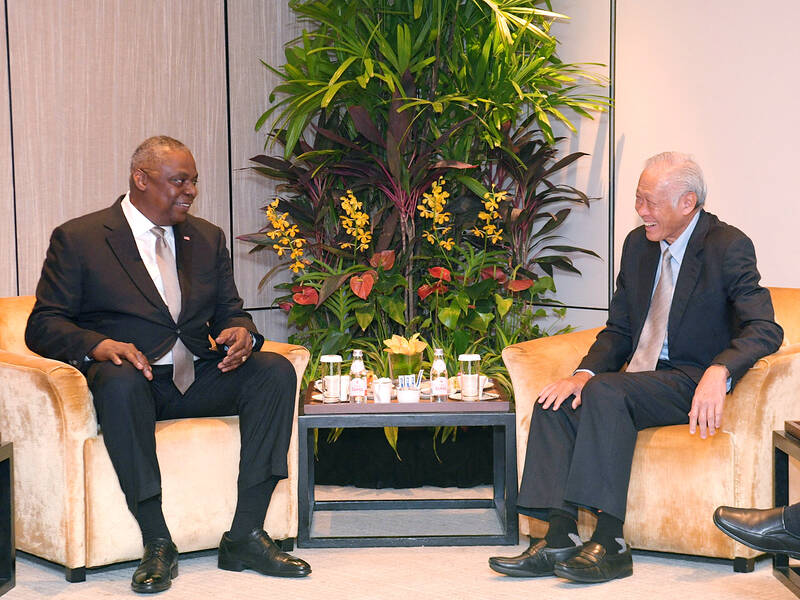As the US and China vie to establish new partnerships and expand influence with nations in the Asia-Pacific region, top defense officials from both countries are preparing to win support from their regional counterparts, diplomats and leaders at a security forum in Singapore this weekend.
Australian Prime Minister Anthony Albanese, whose country is a stalwart US ally in the Pacific region, was to give the keynote address yesterday evening to open the dialogue at the Shangri-La Hotel hosted by the International Institute for Strategic Studies.
Albanese, whose country has angered Beijing with its agreement with the UK and the US, known as AUKUS, to obtain nuclear-powered submarines to address a perceived rising threat from China, said that he would focus on Australia’s deepening engagement, as well as “shared opportunities and challenges” in the region.

Photo: Reuters
“We want a region that is stable, peaceful, resilient and prosperous,” he said when his speech was announced.
This year’s dialogue comes amid a wide range of issues, including the war in Ukraine and its regional implications, China’s support for Russia, the conflict in Myanmar, and growing tensions between China and the US over Beijing’s claims to Taiwan.
US Secretary of Defense Lloyd Austin would today give an opening speech on US “leadership in the Indo-Pacific,” the Pentagon said.
Chinese Minister of National Defense Li Shangfu (李尚福) would tomorrow lead with a speech on his country’s new security initiatives.
Austin began his trip to the region in Japan, where Japanese Prime Minister Fumio Kishida has been one of the most outspoken leaders in Asia against the Russian invasion of Ukraine.
Kishida has ramped up Japan’s defense spending, and cautioned others at the Shangri-La forum last year that “Ukraine today may be East Asia tomorrow.”
China has refused to criticize Russia’s invasion of Ukraine, and has blamed the US and NATO for provoking Moscow.
During a trip in April to Moscow, Li pledged to expand military cooperation, military-technical ties and the arms trade with Russia.
“We will certainly take them to a new level,” he said at the time.
On the sidelines of the conference in Singapore, Austin plans to meet with “key leaders to advance US defense partnerships across the region in support of our shared vision for a free and open Indo-Pacific anchored in ASEAN centrality,” the US Department of Defense said.
Following the conference, Austin would travel to New Delhi to meet with his Indian counterpart for talks on issues including expanding “operational cooperation between the US and Indian militaries,” it said.
Like the US, many of its allies have been increasing their focus on the Indo-Pacific region, and the conference brings together many top officials, including defense ministers from Australia, Canada, Germany, Japan, the Netherlands, New Zealand, South Korea, Sweden, the UK and Ukraine.

STILL COMMITTED: The US opposes any forced change to the ‘status quo’ in the Strait, but also does not seek conflict, US Secretary of State Marco Rubio said US President Donald Trump’s administration released US$5.3 billion in previously frozen foreign aid, including US$870 million in security exemptions for programs in Taiwan, a list of exemptions reviewed by Reuters showed. Trump ordered a 90-day pause on foreign aid shortly after taking office on Jan. 20, halting funding for everything from programs that fight starvation and deadly diseases to providing shelters for millions of displaced people across the globe. US Secretary of State Marco Rubio, who has said that all foreign assistance must align with Trump’s “America First” priorities, issued waivers late last month on military aid to Israel and Egypt, the

France’s nuclear-powered aircraft carrier and accompanying warships were in the Philippines yesterday after holding combat drills with Philippine forces in the disputed South China Sea in a show of firepower that would likely antagonize China. The Charles de Gaulle on Friday docked at Subic Bay, a former US naval base northwest of Manila, for a break after more than two months of deployment in the Indo-Pacific region. The French carrier engaged with security allies for contingency readiness and to promote regional security, including with Philippine forces, navy ships and fighter jets. They held anti-submarine warfare drills and aerial combat training on Friday in

COMBAT READINESS: The military is reviewing weaponry, personnel resources, and mobilization and recovery forces to adjust defense strategies, the defense minister said The military has released a photograph of Minister of National Defense Wellington Koo (顧立雄) appearing to sit beside a US general during the annual Han Kuang military exercises on Friday last week in a historic first. In the photo, Koo, who was presiding over the drills with high-level officers, appears to be sitting next to US Marine Corps Major General Jay Bargeron, the director of strategic planning and policy of the US Indo-Pacific Command, although only Bargeron’s name tag is visible in the seat as “J5 Maj General.” It is the first time the military has released a photo of an active

CHANGE OF MIND: The Chinese crew at first showed a willingness to cooperate, but later regretted that when the ship arrived at the port and refused to enter Togolese Republic-registered Chinese freighter Hong Tai (宏泰號) and its crew have been detained on suspicion of deliberately damaging a submarine cable connecting Taiwan proper and Penghu County, the Coast Guard Administration said in a statement yesterday. The case would be subject to a “national security-level investigation” by the Tainan District Prosecutors’ Office, it added. The administration said that it had been monitoring the ship since 7:10pm on Saturday when it appeared to be loitering in waters about 6 nautical miles (11km) northwest of Tainan’s Chiang Chun Fishing Port, adding that the ship’s location was about 0.5 nautical miles north of the No.